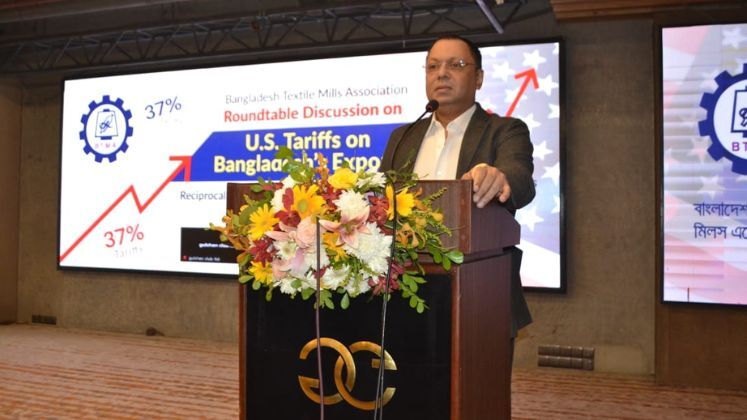
In a bid to reduce the trade gap between Bangladesh and the United States, textile millers and garment exporters are calling on the Government to boost imports from the US market. This appeal was made during a roundtable discussion titled US Tariffs on Bangladesh’s Exports: Reciprocal Strategies and Way Forward for Negotiations, organised by the Bangladesh Textile Mills Association (BTMA) in Dhaka on Saturday.
Showkat Aziz Russell, president of the BTMA, emphasised the importance of leveraging Bangladesh’s significant imports of American cotton to manufacture cotton-based garments, which could then secure duty-free access to the US market. He underscored the need for robust Government support and increased foreign direct investment (FDI) to bolster employment and competitiveness within the textile sector.
Masrur Reaz, chairman of Policy Exchange Bangladesh, highlighted the strategic significance of the recent 90-day deferment of new US tariffs on Bangladeshi goods. He urged stakeholders to move beyond mere diplomacy and pursue market-based solutions. “Bangladesh must act decisively—by engaging buyers and brands, increasing US content in exports, and assessing sector-specific impacts—to secure long-term access to the US market,” said Reaz.
Key recommendations from the roundtable included raising US content in manufactured goods to 20 per cent to qualify for reduced tariffs and establishing US cotton storage hubs in Bangladesh to streamline imports and eliminate logistical barriers. Participants also advocated for investments in infrastructure, industrial capacity, and human capital to enhance productivity and global market readiness, as well as encouraging US investments in diversified sectors.
The importance of incorporating the US private sector into ongoing free trade agreement (FTA) discussions alongside Government efforts was also emphasised. Experts expressed cautious optimism regarding evolving global trade dynamics, but cautioned that failure to act could result in long-term setbacks for Bangladesh’s trade competitiveness.
During the roundtable, experts warned the Government to seize the opportunity presented by the 90-day suspension of US tariffs, noting that inaction could jeopardise trade competitiveness. The US recently imposed a steep 37 per cent retaliatory tariff on imports from several countries, including Bangladesh, but announced a suspension on 9th April, maintaining only the standard 10 per cent tariff.
“This pause gives us a strategic window,” Reaz remarked. He highlighted the necessity of exploring reciprocal concessions, such as bonded warehouse facilities for US cotton exporters, to balance the trade relationship.
Md Anwar Hossain, vice chairman of the Export Promotion Bureau and administrator of the Bangladesh Garment Manufacturers and Exporters Association (BGMEA), acknowledged the tariff issue as both a challenge and an opportunity. He urged prompt action to implement longstanding reform proposals to position Bangladesh advantageously.
Anwar-ul-Alam Chowdhury, president of the Bangladesh Chamber of Industries, stressed the importance of understanding the US perspective and considering what Bangladesh can offer post-LDC graduation. Meanwhile, Hafizur Rahman, administrator of the Federation of Bangladesh Chambers of Commerce and Industry, pointed out that Bangladesh must explore regional and bilateral FTA options to reduce dependency on the US and enhance trade advantages.
Muhibuzzaman, managing director of ACI Healthcare, expressed concerns about the potential impact on pharmaceuticals if they fall under the reciprocal tariff regime, emphasising the need for clarity and a thoughtful approach to achieve a mutually beneficial outcome.
The discussions reflected a collective urgency among industry leaders to act decisively during this critical period to enhance Bangladesh’s trade standing with the United States.






